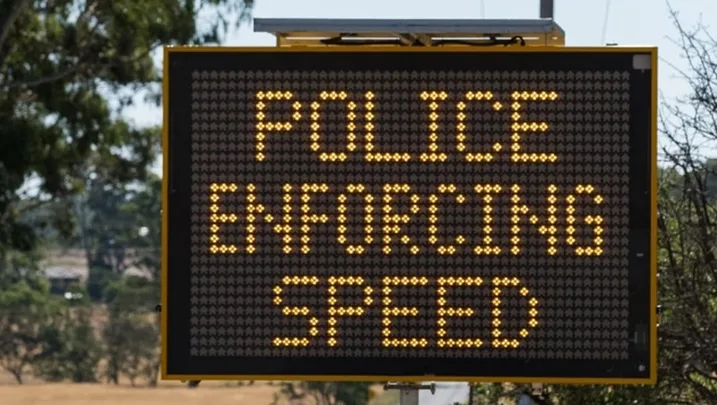The best way to avoid paying a speeding fine is probably to be a Buddhist. You don’t see them driving much, for a start, as they seem to prefer to slap their sandals on solid Earth, and not sitting in a car at all is probably the only sure-fire way to avoid speeding tickets, particularly if you live in Victoria.
Being a Buddhist, or at least a hugely calm and non-confrontational human, will also help if you are pulled over by one of the charming, moustache-loving, jodhpur-jellying members of the Highway Patrol. That’s because the first thing you have to do, no matter what the circumstances of your alleged offence, is to stay calm.
Essentially there are three ways things can go, from this point, and you only have any chance of controlling those outcomes if you avoid ill-judged behaviour, like making terrible excuses – “a fairy landed on my knee”, “my dog just rang to tell me my homework is on fire” or “I have to get to McDonald’s before the breakfast menu stops”. (That last one is real, according to PoliceOne.com, which also offers our personal favourite: “I wasn’t speeding, I just got a haircut and it makes me look fast”).
The Warning – or Best Case Scenario
Ask any friendly policeman and they’ll tell you that nothing is surer to get you booked, straight away and for the maximum amount, than making a lame excuse.
It’s vital to remember that, while some of them might pretend otherwise, police have a discretionary power, which means they can choose to give you a warning rather than a ticket (this is less likely if you’re doing a licence-melting speed like 30km/h over the limit or more).
This discretionary power is your first and best hope, and what it requires from you is beatific levels of calm, honesty and overwhelming sorrow and regret.
Highway patrol officers are often not the most merciful human beings on Earth.
Police officers asked on Reddit to give advice on what a motorist can say that might cause them to be merciful seem pretty united in their advice that making an excuse gets you a ticket, but being honest – “I have no excuse, I just stuffed up” – saying sorry and promising never to do it again is your best chance.
But here’s the thing, and also where it gets tricky. Based on thorough research I’ve selflessly conducted over the years by being pulled over multiple times, and on stories told by dozens of motoring-journalist colleagues, and actual friends, highway patrol officers are often not the most merciful human beings on Earth. Indeed, some of them don’t seem to be human at all.
As one police officer once put it to me: “They’re the scum of the Earth, the lowest of the low, even other officers don’t like them, and they honestly seem to relish being hated by people.”
This kind of officer is about as likely to give you a warning as he is to offer you a go of his gun, or a bite of his donut.
The Challenge
So, we come to outcome two, which is that no matter what you say, the bloke who’s pulled you over is going to book you, and if you don’t want to pay your only recourse is going to be a legal one.
Obviously, using your Buddhist skills of calm, and reading the aura of other people, you’ve probably got just a few seconds from when you clock the officer to when you have to make your decision to abandon the regret and apology tactic and go for the second option – Deny Everything.
Remember that if you’re going to court anything you say will be used against you, which is why the cop will generally ask you “did you realise/is there any reason you were speeding back there?”. At this point you must categorically deny that you were speeding at all.
People shouldn’t feel that they have to pay a fine immediately only because it’s been issued.
If they ask you to say how fast you were going, you say the speed limit. And now hold on tight, because this is quite likely to make the man in the moustache a little angry.
The best thing to do at this point is use your inner calm and say nothing, and just wait for the ticket to be handed over.
From this point, it’s probably best to go back and take photos or even videos of the section of road on which you were booked, because they might come in handy, and get the speed-limit signs in those photos, of course.
“People shouldn’t feel that they have to pay a fine immediately only because it’s been issued,’ Andrew Tiedt from Armstrong Legal explains.
“People should look into the details, they should see what reason there might be for some leniency to be granted.”
What you’re hoping for is some technical reason why your fine won’t stand up. If the police car that booked you was coming towards you at the time, remember that its radar has to lock on to you for long enough to make an accurate estimate of your speed.
Police officers can make a visual estimate of speed, but again, this is worth challenging in court.
If you get caught by a car coming towards you around a corner, for example, you can probably challenge whether the radar had time to accurately estimate your speed.
Police officers can make a visual estimate of speed, but again, this is worth challenging in court.
Also consider whether there might have been other cars in a lane near you that might mistakenly have been locked on to. Think of every legal show you’ve ever seen on TV, and the phrase “reasonable doubt”.
At this stage, obviously, what you need to do is lawyer up, because there are plenty of specialists in traffic law out there who know all the various grounds on which you can challenge a fine and win.
Figures obtained by Channel Seven in Sydney under Freedom of Information show it is worth a try because, in 2015, one out of every four drivers who applied had their fines overturned, saving them more than $4 million in total.
“It’s not really well known, we’d like people to be more aware of it,” Steve Brady from the Office of State Revenue told Seven.
“What’s important is that when you go on the website have a look at the reasons.”
Medical emergencies or errors on the fine were also valid reasons to challenge a fine, he pointed out.
But if you’re going to pretend you’re on the way to hospital to give birth, you’d better be a woman.
Frustrate and Avoid
Another method, which this writer may or may not have used, is to apply to defend yourself in court and then continually fail to get there.
This can work if you were booked far from home and you’re expected to attend the local court where it happpened. Just keep writing in and explaining why you can’t make a particular date, and proclaiming your innocence at the same time.
Eventually, with a bit of luck, you might get what’s called a Section 10, which means you admit your guilt but don’t have to pay a fine.
Section 10 of the Crimes Act, “enables a court, upon a plea or finding of guilt, to order the dismissal of charges without proceeding to record a conviction”.
You’re Busted
Let’s be honest here for a second, people. Most of the time, particularly if you’re just caught bang to rights on an open, straight road in broad daylight with no other cars around and no excuse, you’re probably going to get a ticket, and nothing you can do is going to prevent it.
In this case, which is the unfortunate third outcome, your only real hope is to throw yourself on the mercy of the officer and hope for outcome one.
Speed Camera Fines
This is a whole different kettle of fish, obviously, because unless you can prove the particular camera that snapped you was faulty in some way – and yes, that has happened before – then you’re pretty much a dead fish.
The only thing you can do here, particularly if you’re worried about your demerit points situation, is to do something we would never recommend, which is to commit a modicum of fraud and get someone else – your mother, your sainted aunt, a Buddhist – to say they were driving the car at the time.
Your best defence, when challenging a fine in writing, is a clean driving record.
Not just because they can afford to lose the points, but because they have a clean record. This allows you to write a pleading letter to the authorities (you’ll find their address on your fine notice somewhere) saying how you’ve never been booked speeding before, you’d just borrowed your son/nephew/agnostic friend’s very fast car and it got away from you, and begging for leniency. This, we’ve heard, can also genuinely work.
Your best defence, when challenging a fine in writing, is a clean driving record. But we are talking very clean; like no fines at all for the past 10 years.
“As long as it’s a lower-range offence, we’re happy to give them a caution, then they don’t get demerits and they don’t get a fine,” a spokesman from the Office of State Debt Recovery explained.
In 2015, in NSW alone, some $2.3m worth of speeding fines were torn up by the State Goverment for drivers with good records.
Obviously, you’ll only get away with this approach once, because you’re dirtying up your clean record by doing it.
This article originally appeared on CarsGuide.










